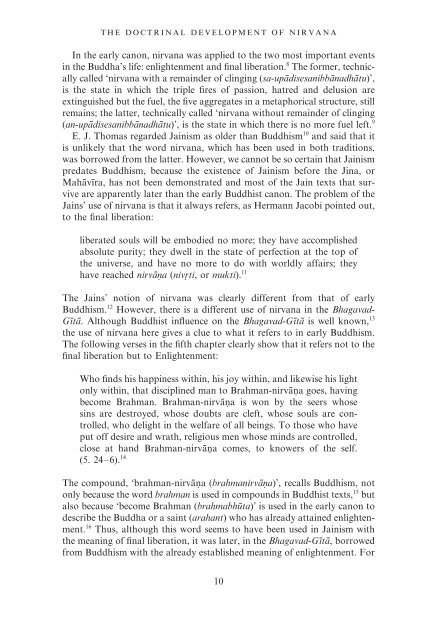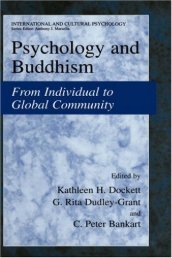Metaphor and Literalism in Buddhism: The ... - misterdanger.net
Metaphor and Literalism in Buddhism: The ... - misterdanger.net
Metaphor and Literalism in Buddhism: The ... - misterdanger.net
Create successful ePaper yourself
Turn your PDF publications into a flip-book with our unique Google optimized e-Paper software.
THE DOCTRINAL DEVELOPMENT OF NIRVANA<br />
In the early canon, nirvana was applied to the two most important events<br />
<strong>in</strong> the Buddha’s life: enlightenment <strong>and</strong> f<strong>in</strong>al liberation. 8 <strong>The</strong> former, technically<br />
called ‘nirvana with a rema<strong>in</strong>der of cl<strong>in</strong>g<strong>in</strong>g (sa-upAdisesanibbAnadhAtu)’,<br />
is the state <strong>in</strong> which the triple fires of passion, hatred <strong>and</strong> delusion are<br />
ext<strong>in</strong>guished but the fuel, the five aggregates <strong>in</strong> a metaphorical structure, still<br />
rema<strong>in</strong>s; the latter, technically called ‘nirvana without rema<strong>in</strong>der of cl<strong>in</strong>g<strong>in</strong>g<br />
(an-upAdisesanibbAnadhAtu)’, is the state <strong>in</strong> which there is no more fuel left. 9<br />
E. J. Thomas regarded Ja<strong>in</strong>ism as older than <strong>Buddhism</strong> 10 <strong>and</strong> said that it<br />
is unlikely that the word nirvana, which has been used <strong>in</strong> both traditions,<br />
was borrowed from the latter. However, we cannot be so certa<strong>in</strong> that Ja<strong>in</strong>ism<br />
predates <strong>Buddhism</strong>, because the existence of Ja<strong>in</strong>ism before the J<strong>in</strong>a, or<br />
Mahavcra, has not been demonstrated <strong>and</strong> most of the Ja<strong>in</strong> texts that survive<br />
are apparently later than the early Buddhist canon. <strong>The</strong> problem of the<br />
Ja<strong>in</strong>s’ use of nirvana is that it always refers, as Hermann Jacobi po<strong>in</strong>ted out,<br />
to the f<strong>in</strong>al liberation:<br />
liberated souls will be embodied no more; they have accomplished<br />
absolute purity; they dwell <strong>in</strong> the state of perfection at the top of<br />
the universe, <strong>and</strong> have no more to do with worldly affairs; they<br />
have reached nirvAOa (nivKti, or mukti). 11<br />
<strong>The</strong> Ja<strong>in</strong>s’ notion of nirvana was clearly different from that of early<br />
<strong>Buddhism</strong>. 12 However, there is a different use of nirvana <strong>in</strong> the Bhagavad-<br />
GCtA. Although Buddhist <strong>in</strong>fluence on the Bhagavad-GCtA is well known, 13<br />
the use of nirvana here gives a clue to what it refers to <strong>in</strong> early <strong>Buddhism</strong>.<br />
<strong>The</strong> follow<strong>in</strong>g verses <strong>in</strong> the fifth chapter clearly show that it refers not to the<br />
f<strong>in</strong>al liberation but to Enlightenment:<br />
Who f<strong>in</strong>ds his happ<strong>in</strong>ess with<strong>in</strong>, his joy with<strong>in</strong>, <strong>and</strong> likewise his light<br />
only with<strong>in</strong>, that discipl<strong>in</strong>ed man to Brahman-nirvaoa goes, hav<strong>in</strong>g<br />
become Brahman. Brahman-nirvaoa is won by the seers whose<br />
s<strong>in</strong>s are destroyed, whose doubts are cleft, whose souls are controlled,<br />
who delight <strong>in</strong> the welfare of all be<strong>in</strong>gs. To those who have<br />
put off desire <strong>and</strong> wrath, religious men whose m<strong>in</strong>ds are controlled,<br />
close at h<strong>and</strong> Brahman-nirvaoa comes, to knowers of the self.<br />
(5. 24–6). 14<br />
<strong>The</strong> compound, ‘brahman-nirvaoa (brahmanirvAOa)’, recalls <strong>Buddhism</strong>, not<br />
only because the word brahman is used <strong>in</strong> compounds <strong>in</strong> Buddhist texts, 15 but<br />
also because ‘become Brahman (brahmabhEta)’ is used <strong>in</strong> the early canon to<br />
describe the Buddha or a sa<strong>in</strong>t (arahant) who has already atta<strong>in</strong>ed enlightenment.<br />
16 Thus, although this word seems to have been used <strong>in</strong> Ja<strong>in</strong>ism with<br />
the mean<strong>in</strong>g of f<strong>in</strong>al liberation, it was later, <strong>in</strong> the Bhagavad-GCtA, borrowed<br />
from <strong>Buddhism</strong> with the already established mean<strong>in</strong>g of enlightenment. For<br />
10











